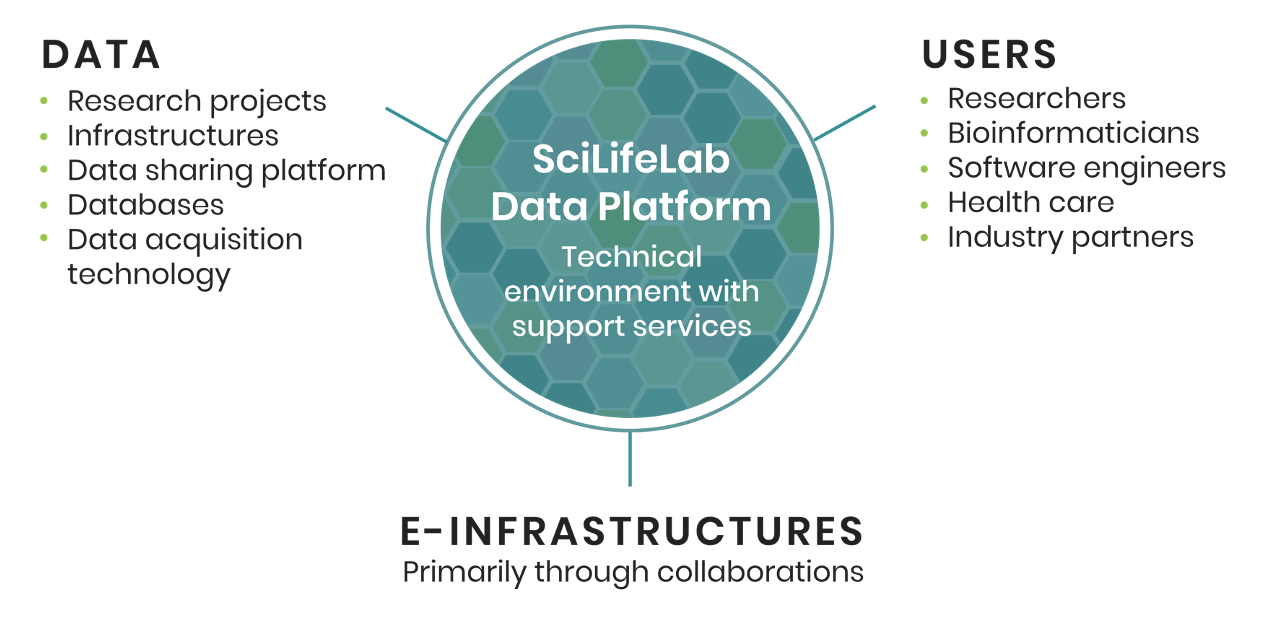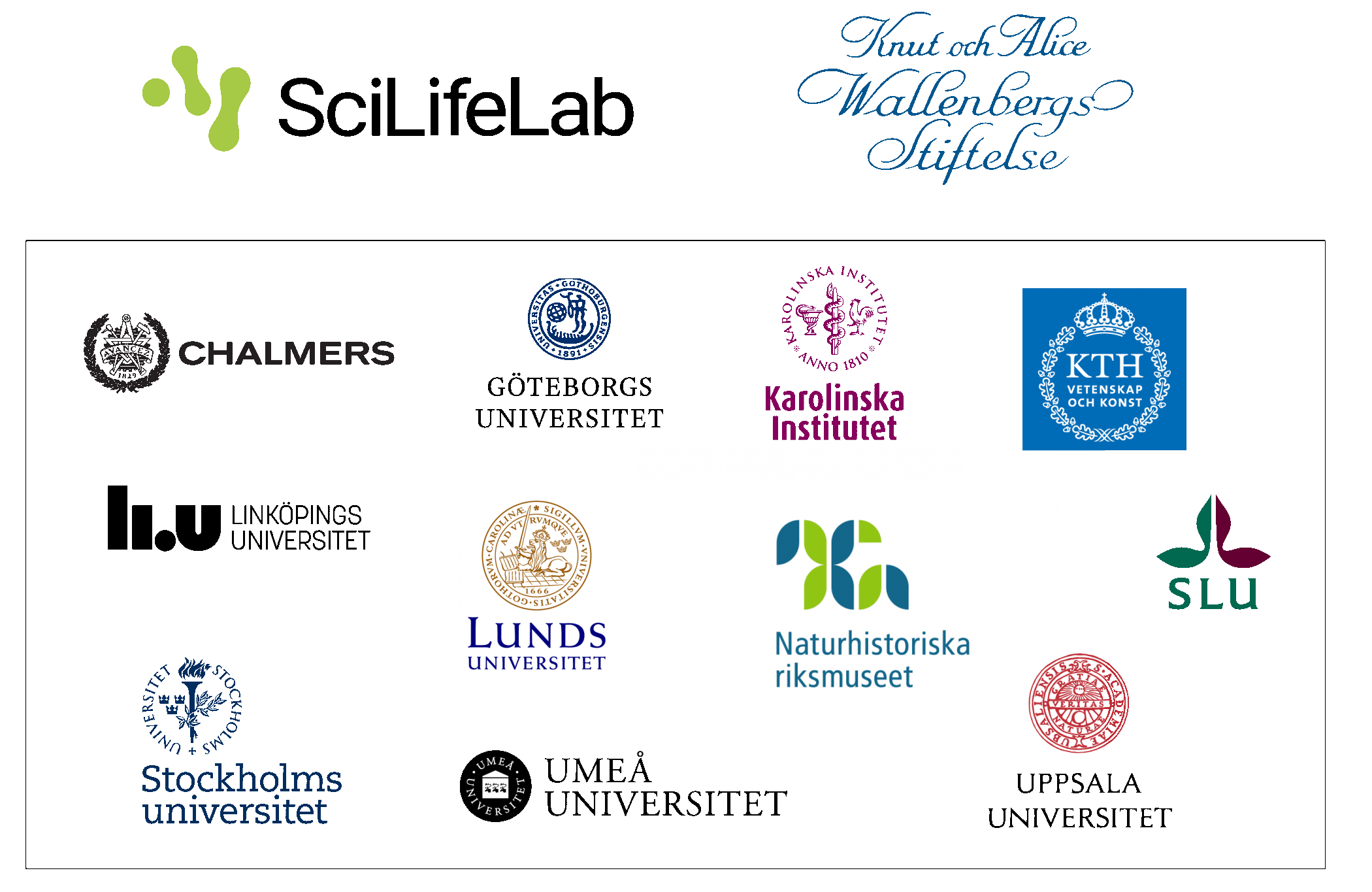Data-driven life science research
Life science, the science of all things living, is becoming increasingly data-driven. The amount and complexity of research data produced by the field has grown rapidly in recent years. Today, a substantial amount of life science data is shared openly within the global research community. These data can be, and has been, used to fuel further discoveries in multiple fields, including healthcare practices, drug discovery, veterinary medicine, plant research, biotechnology, and food science.
Swedish life science research has an excellent reputation globally. Sweden has fostered many well-known scientists, from botanist Carl von Linné to present-day Nobel Prize winners. A number of programs to promote and support work in Swedish data-driven life science have now been established to ensure that the global reputation of Swedish life science research is upheld far into the future, and the SciLifeLab Data Platform is one such initiative.
About the SciLifeLab Data Platform
In order for the Swedish life science research community to generate cutting-edge data-driven research, it will need access to appropriate services, tools, and support. The SciLifeLab Data Platform comprises both a technical infrastructure for data-centric research and a website that promotes relevant services, research, events, and training. The platform is funded by the SciLifeLab & Wallenberg National Program for Data-Driven Life Science (DDLS) but is open to all life science researchers and data-producing facilities in Sweden, regardless of their affiliation with DDLS.
The services hosted on the SciLifeLab Data Platform adhere to the values of Open Science, Transparent research, and FAIR (Findable, Accessible, Interoperable, Reusable), as well as good data management practices throughout the data lifecycle.
The SciLifeLab Data Platform was built and is maintained by the SciLifeLab Data Centre and our partners. We welcome any questions on any element of the platform. Please get in touch with us by emailing datacentre@scilifelab.se or by sending us a message using our contact form.
Vision & mission
This platform aims to boost the number of services available for data-driven life science research in Sweden. Our vision is to create an envronment in which our users can easily locate, access, and use life science resources (including data, tools, and e-infrastructure).


Hosting environment
The SciLifeLab Data Platform will provide a hosting environment for web-based computational tools and databases supporting data-driven life science research. This service will accommodate compute-intensive applications and large datasets, offering infrastructure for researchers to share and manage their resources effectively.
Initially, the hosting environment will focus on integrating services developed by SciLifeLab Data Centre and its partners. In the future, researchers, research groups, and organizations will be able to apply for hosting. Details about the application process and eligibility criteria will be announced when the service is launched. Some services, particularly those designed for data-producing units, may have specific access restrictions.
This service will align with best practices in data management, ensuring compliance with Open Science, Transparent research, and FAIR data principles.
Find out more about applying for hosting
Website
The SciLifeLab Data Platform website is available at data.scilifelab.se. It aims to showcase and promote services and research related to data-driven life science in Sweden, as well as relevant events, training, and community-driven initiatives.
The content of the website is moderated by the team behind the SciLifeLab Data Platform. However, much of the content is contributed by the research community. Contributions are welcome in each of the sections. For example, you can suggest a data highlight, an event, or a training opportunity. We’d also be happy to receive suggestions about other types of content that is not currently available on the platform.
Contact form for enquiries and contributions
Organisations behind the platform
SciLifeLab
SciLifeLab (Science for Life Laboratory) is an institution for the advancement of molecular biosciences in Sweden. We are funded as a national research infrastructure by the Swedish government.
Our organisation leverages the unique strengths of individual researchers across Sweden into a focused resource for the life science community. For example, we provide thousands of researchers in Sweden with access to the cutting-edge instrumentation and scientific expertise necessary to be internationally competitive in bioscience research. The infrastructure that we provide is, in turn, supported and further developed by our research community, which includes internationally recognised experts in life science and technology. This results in a unique environment for carrying out health and environmental research at the highest level.
SciLifeLab started in 2010 as a joint effort between four universities; Karolinska Institutet, KTH Royal Institute of Technology, Stockholm University and Uppsala University. Today, we support research activities at all major Swedish universities.
For more information about SciLifeLab, please see scilifelab.se.
SciLifeLab Data Centre
Life science research is increasingly becoming not only technology-driven, but also data-driven. SciLifeLab coordinates and supports activities throughout the data lifecycle. This includes project planning, data production, data analysis, data sharing, through to the publication and reuse of data, where researchers are dependent on advanced data analysis and e-infrastructures.
SciLifeLab Data Centre focuses primarily on data generated by SciLifeLab infrastructure platforms. We work to maximise the value, and biological insight, that can be obtained from data, and to enable infrastructure to make data findable and accessible. At SciLifeLab Data Centre, we see data as one of the most valuable and long-lasting products of our operations and strive to make our data FAIR, ensure that it is handled according to open science standards, and to maximise its long-term value to the scientific community.
General information about the Data Centre is available at scilifelab.se/data/.
Partner organisations
The SciLifeLab Data Platform is funded by the SciLifeLab & Wallenberg National Program for Data-Driven Life Science (DDLS). A total of 3.1 billion SEK has been granted from the Knut and Alice Wallenberg Foundation over a period of 12 years. The purpose of the program is to train the next generation of life scientists, to create a strong computational and data science base, and to strengthen the competencies in today’s research society. Thereby, the program will ultimately enable every scientist to better analyse data patterns and integrate their data with the global data flows in life sciences. Furthermore, the program aims to strengthen national collaborations between universities, to build bridges between life and data science communities, and to create partnerships with industry, healthcare and other national and international entities.
Eleven Swedish organisations are also participating in the DDLS, alongside SciLifeLab and the Knut and Alice Wallenberg Foundation. The organisations involved are shown below:

